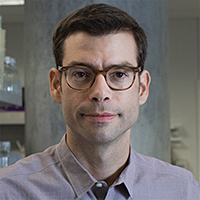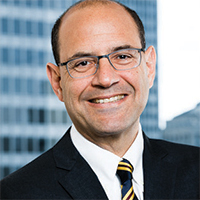
Dr. Helen MacKay
Exactis Innovation & Sunnybrook Hospital

Dr. Simon Turcotte
Exactis Innovation & Centre hospitalier de L’Université de Montréal

Barry D. Stein
Exactis Innovation & Colorectal Cancer Canada

Dr. Gerald Batist
Exactis Innovation & Jewish General Hospital
Precision oncology is about selecting the right drug or treatment for the right patient at the right time. Exactis Innovation is a pan-Canadian network helping Canadian cancer patients and their clinicians do just that. Since December 2015, the Personalize My Treatment (PMT)™ initiative has been enrolling cancer patients into a registry that captures the patients’ medical history and the molecular and genomic characteristics of their cancer.
The ultimate goal of the network is to increase the number of precision oncology trials in Canada and to match patients in the registry to these trials. Solving the challenges of matching patients with the right treatment in the clinical research setting will not only attract more trials but importantly, will create greater access for Canadian cancer patients to novel targeted treatments.
Mediaplanet spoke with three clinicians and a key patient group advocate for more insight into the field.

Dr. Helen MacKay
Chair – Principal Investigator Coordinating Committee, Exactis Innovation & Head – Division of Medical Oncology and Hematology, Sunnybrook Hospital
How has the role of patient participation in clinical trials evolved?
Dr. Helen MacKay: There has been a real change in the culture around clinical trials. Patients and their families are so much more involved and aware of the importance of clinical trials than in the past. Individual patients and advocacy groups are getting involved at every stage, from study design to increasing awareness and accrual, to evaluating the outcome and helping to bring new advances into the clinic. New patient-centred tools allow patients to report on their experiences with new drugs and how that impacts their lives and the lives of those around them. This helps us to further tailor treatment advances and truly personalize treatment.
Is there sufficient data to provide personalized treatment in clinical settings?
This is a growing area — there is more real-world clinical data being assembled now which helps us to see which drugs are actually benefitting patients beyond the clinical trial setting.
What impact can precision oncology clinical trials have on patient care?
Doctors want what everyone wants for patients (and ourselves): to be given treatment which we know will work. Rationally designing clinical trials and potentially incorporating predictive biomarkers, helps us to work towards achieving this goal. Clinical trials can also increase treatment options for patients, especially for cancers where the options are few. Finally, by looking for factors which predict side effects we may, in the future, be able to design strategies to help patients avoid them.

Dr. Simon Turcotte
Vice Chair – Principal Investigator Coordinating Committee, Exactis Innovation & Surgical Oncologist, Centre hospitalier de L’Université de Montréal
Why is translational biomarker research so important for precision oncology, and how can patients contribute to it?
Dr. Simon Turcotte: Translational research is about filling the gap between the biology of the cancer and the treatment of patients. Researching the patients’ tumours, blood, and tissue specimens enables scientists to identify biomarkers that better predict response or resistance to treatment. Patients help in developing precision oncology by consenting to molecular profiling of their blood and tumours.
What kind of information does molecular analysis of the tumours generate?
Molecular analysis is anything from studying tumour gene mutations and how they affect cancer cell growth to looking at immune cells and how they fight the tumour. Ultimately, we will use these findings to offer patients gene-based or immune-based therapies that achieve a higher percentage of cures, longer survivorships, and less toxicity.

Barry D. Stein
Member – Board of Directors, Exactis Innovation & CEO, Colorectal Cancer Canada
How is the challenge of patient recruitment into precision oncology being met?
Barry D. Stein: Patient groups are at the forefront of this challenge. By understanding patients’ values and preferences and reporting their outcomes, these groups can encourage patient participation in the creation and design of cancer clinical trials, ensuring better patient recruitment and retention.
Is there sufficient interest in clinical research among patients today?
I believe patients are very interested in research, but often they don’t know how to participate. That’s why it’s important for patient groups to be integrated into the development and implementation of clinical trials to help spread the word.
Why is the voice of the patient so important in precision oncology?
The voice of the patient is paramount. After all, it’s all about patients having equal and timely access to the most effective treatments made possible by precision oncology that will improve their outcomes.

Dr. Gerald Batist
Co-Founder & Chief Medical Officer, Exactis Innovation & Director, Jewish General Hospital
What infrastructures are needed for effective precision oncology research?
Dr. Gerald Batist: In addition to clinical trials to obtain tumour samples and platforms to profile the tumours, we need network and scale. Through PMT, we are building that network and scale which will give us access to large numbers of patients so we can find uncommon sub-groups of the population who might have a gene mutation making them more responsive or resistant to treatment. MP What are the key challenges? GB I’d say getting key opinion leaders in all institutions to work together, putting the legal network in place, and securing infrastructure funding from the government. I also think the public needs to be sensitized to the importance of clinical trials and the benefits of participating in them.
Why is a Canadian network for precision oncology so critical?
PMT is a patient registry that gives us access to thousands of patients so we can contact them if they match a particular drug on our study of their tumour.
Thanks to precision oncology, imagining a world without cancer is no longer out of reach. But it will take continued government funding, patient participation, and more precision clinical studies to make precision oncology a reality.



